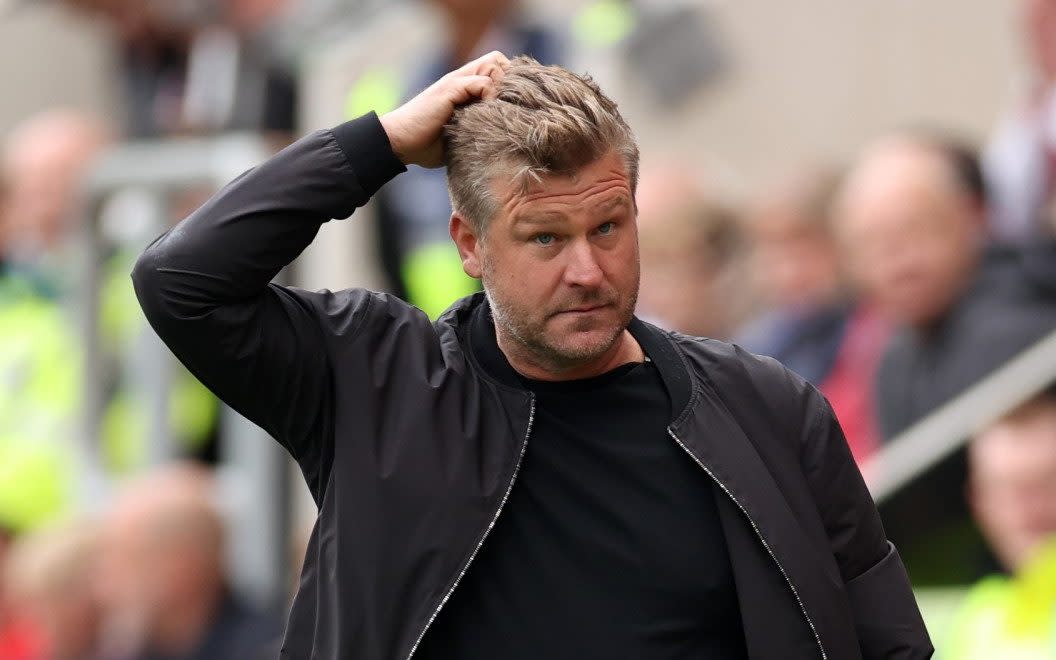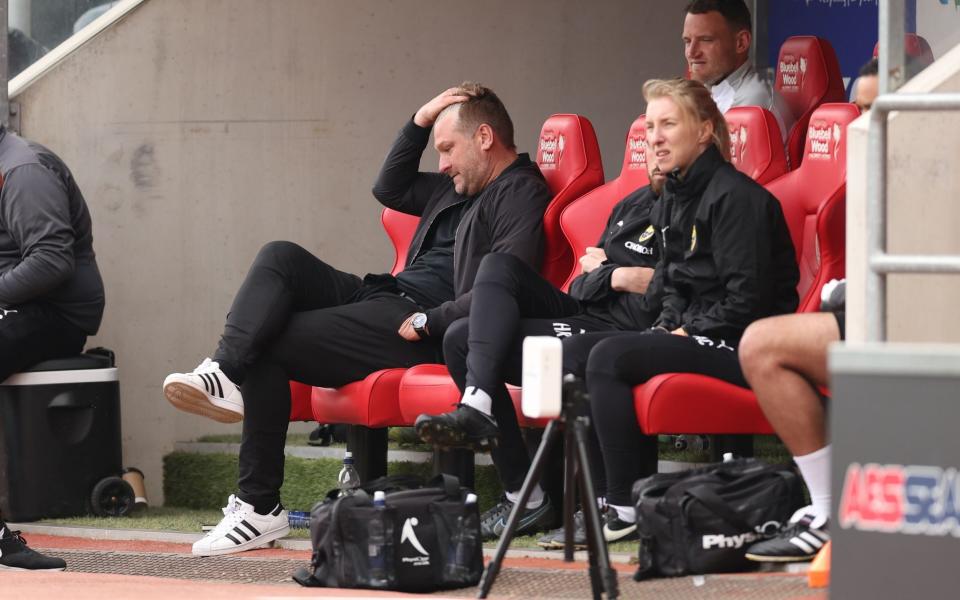Karl Robinson interview: Fans say 'We hope your dad dies of cancer'. I won't take it any more

"Scouse f----t!"
"Gay Scouse c---!"
"Thieving Scouse c---!"
"Hope your dad dies of cancer!"
"97 Scouse c---- gone at Hillsborough - always victims!"
It is April 23 2022, and Rotherham United are at home to Oxford United. It is a crucial League One promotion clash but, for a small but vocal section of home fans behind the dug-out, the match seems a mere sideshow to the opportunity to launch a stream of vile abuse at Karl Robinson, Oxford's manager.
Unusually, you can hear this for yourself. Robinson has been given a microphone as part of a behind-the-scenes podcast series, Moment of Truth, for BBC Five Live. All the invective is caught on the audio and forms the basis of one of the 15 episodes.
It is disturbing listening and, at one point, an exasperated Robinson even threatens to stop the game unless the stewards take action.
“They just throw things at you – about my dad, my mum, my kids,” he says of the abuse. “My dad might have passed away, he might be ill – thankfully he is not. Maybe that kind of abuse has always been there but in this podcast it is very evident what gets said. It’s something that needed to be left in. Some people might say ‘why did you have to do that?’ But it’s important.
“From the minority, no, that abuse was not unusual. I hate talking about the minority because there is so much good in the game but it happened. And sometimes it leaves you at breaking point.”

Despite being just 41 Robinson is one of the most experienced and respected managers in the English Football League. He started managing at 29 with MK Dons, and, remarkably, already has 650 games to his name. But he admits he was shaken by what happened at Rotherham.
“Being from Liverpool comes up a lot, Hillsborough comes up. Liverpool is a city I am immensely proud of but people make terrible statements,” Robinson says. “I thought Covid would have stopped a lot of negative things being said but all it’s done is increase the criticism, especially on social media which, at that time, was the only way for people to connect. On top of that, going back to stadiums has not made it any better. We all had this vision that the world would be a better place, that we would appreciate it more. But no."
Robinson takes a breath. “Listen, my language can be terrible, and it’s part of me that I want to make better, but it’s not abusive.
"One of the bits we left in the podcast was someone saying the word ‘poof’ to me. I said, ‘Be careful - you don’t know the effect that can have on the person next to you’. The young guy, Jake Daniels, came out at Blackpool earlier this year and we wonder why it doesn’t happen more."
This is not to single out Rotherham - Robinson is at pains to acknowledge that the Yorkshire club are "one of the nicest" in the league, full of "very good people". Such comments will provide a soundtrack to matches up and down the land once the new domestic season begins, all of which makes you wonder why managers are prepared to put themselves through it all.
'Moment of Truth' is a candid portrait of the toll the job takes. Robinson is one focus for the series; the other, ironically, is Rotherham’s Paul Warne.
The pair are good friends and their warmth shines through, even if it is tested by their respective clubs tussling for the prize of promotion. Rotherham ultimately gain automatic promotion to the Championship; Oxford just miss out on the play-offs and both men are searingly honest in the emotions they go through and the effect the job has on them and their families.
Robinson has a striking analogy when he considers how it feels to patrol his technical area.
“You are like a tiger in a zoo,” he says. “And everyone judges you on a two-metre-by-six-metre space. It’s only a tiny part of who I am but it is 100 per cent of what people see. I am not a reserved manager. When I am at a club I am all in and I am there to win."
Experience has taught Robinson to be more open – although admirably it has always been in his nature – and this is another reason why he agreed to the podcast, which he hopes will give a greater sense into what it really is like to be a football manager.
“I probably acted in the beginning in the wrong way. I tried to pretend it didn’t bother me. But I am comfortable being vulnerable now,” Robinson says. “I see it more as a sign of strength than a weakness. Even though I am a football manager I am not detached from the rawness of life, it’s the same with the players. They are not superhuman. It’s me doing a job. It’s not the job defining me.”
There are touching exchanges in the podcast in which Robinson’s wife, Ann, and his 16-year-old daughter, Jasmine, talk about the impact his work has on them. Warne's wife, Rachel, does the same.
Robinson admits that being a manager has “tested” his marriage but seems relieved that Jasmine is able to treat the abuse with a degree of "flippancy". It is her way of dealing with it.
Not that Robinson wants to sanitise the game. Far from it. He hated the “soullessness” of games behind closed doors.
“There are certain places you go where, as I have done for so long, you actually get to know some of the people [behind the dugouts],” Robinson says. “There’s a guy at Accrington. He’s funny, he’s witty and he gets to me sometimes. He’s trying to put me off my game but he is never abusive. Sheffield Wednesday, also, is a great place. People are brilliant. At no stage do they talk about where I am from or parents but they give me loads of criticism. I don’t want to sanitise it. I don’t want to lose that.”
Robinson's enduring love for the game, and addiction to the thrill of winning, is why throughout the summer he was looking forward to Oxford's opening League One game against relegated Derby County.
But, as he intimated at Rotherham, he is not prepared to simply accept abuse that reaches truly intolerable levels.
“Would I stop it [a match]? I think if it got to that point then yes, I would. And I would do it, 100 per cent, if it was one of my players. Something has to be done.”

 Yahoo Movies
Yahoo Movies 
